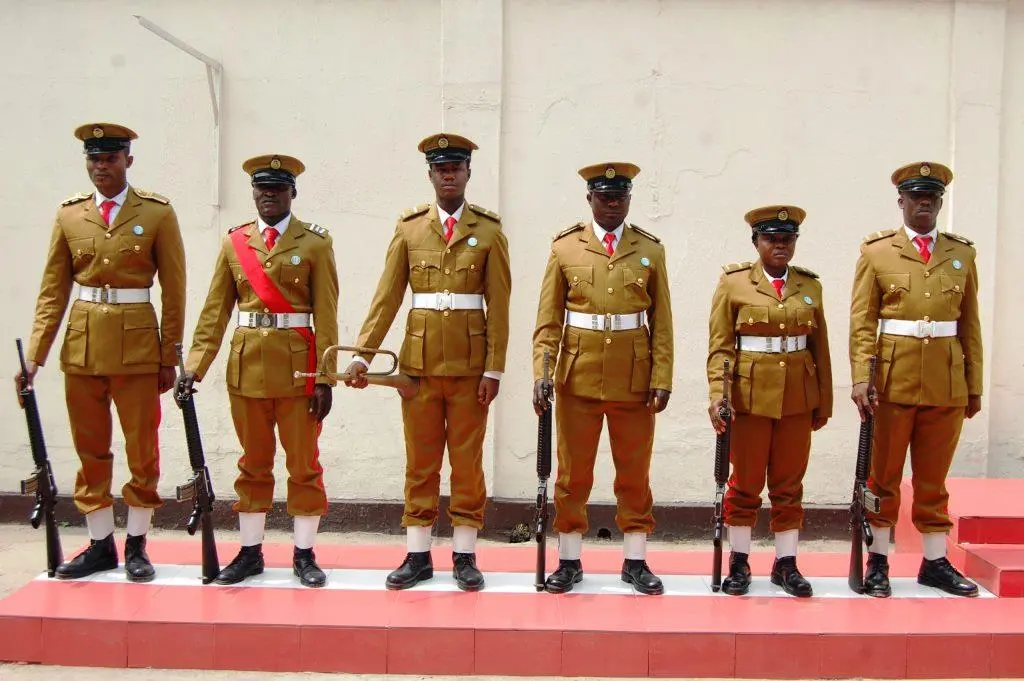- Class: Primary 2
- Term: 3rd Term
- Week: 2
- Age: 7 years
- Duration: 40 minutes
- Subject: National Value Education
- Curriculum Theme: Security Education
- Previous Lesson: Security Agencies (https://www.headteacher.com.ng/lesson-note/lesson-note-on-security-agencies-for-primary-2/)
- Topic: Identification Of Security Agencies And Their Primary Duties – 1
- Content/Learning Area: Mode of dressing, place of assignment, duties
Performance Objectives:
By the end of the lesson, pupils should be able to:
- Cognitive Domain: Identify the mode of dressing and recognize the symbols of various security agencies.
- Affective Domain: Appreciate the roles and responsibilities of security agencies in their community.
- Psychomotor Domain: Demonstrate how to properly address the members of different security agencies based on their uniforms.
- Social Domain: Discuss the importance of security agencies in ensuring the safety and security of the community.
Reference Materials:
The following resources were used in planning this lesson:
- 9 – Years Basic Education Curriculum
- Abuja Educational Resource Centre Scheme of work
- NAPPS National Unified Scheme of Work
- Online Information from Nairaland – Top Security Agencies In Nigeria And Their Roles (https://www.nairaland.com/7229516/top-security-agencies-nigeria-roles)
- Online Information from: Security Agencies (https://www.headteacher.com.ng/lesson-note/lesson-note-on-security-agencies-for-primary-2/)
- Online Information from: Nairaland – Top Security Agencies In Nigeria And Their Roles (https://www.nairaland.com/7229516/top-security-agencies-nigeria-roles)
- Online Information from: NSCDC (https://www.headteacher.com.ng/notes/lesson-plan-on-identification-of-security-agencies-nscdc-basic-2/)
- Online Information from: a white shirt with a red collar on navy blue trousers (https://www.thecable.ng/photos-nscdc-unveils-new-uniform-to-be-worn-on-tuesdays)
- Online Information From (https://www.headteacher.com.ng/lesson-note/lesson-note-on-security-agencies-for-primary-2/)
- Online Information From (https://www.nairaland.com/7229516/top-security-agencies-nigeria-roles)
- Online Information From (https://www.headteacher.com.ng/lesson-note/lesson-note-on-security-agencies-for-primary-2/)
- Online Information From (https://www.nairaland.com/7229516/top-security-agencies-nigeria-roles)
- Online Information From (https://www.headteacher.com.ng/notes/lesson-plan-on-identification-of-security-agencies-nscdc-basic-2/)
- Online Information From (https://www.thecable.ng/photos-nscdc-unveils-new-uniform-to-be-worn-on-tuesdays)
- Online Information From (https://www.headteacher.com.ng/notes/lesson-plan-on-identification-of-security-agencies-nscdc-basic-2/)
- Online Information From (https://www.thecable.ng/photos-nscdc-unveils-new-uniform-to-be-worn-on-tuesdays)
Instructional Materials:
The teacher will teach this lesson with the aid of:
- Pictures of various security agency uniforms
- Charts depicting different security agency badges and emblems
- Real or replica uniforms (if available)
Rationale for the Lesson:
Understanding the identification of security agencies and their primary duties is crucial for young pupils as it helps them recognize the role these agencies play in maintaining law and order in society. This knowledge fosters a sense of security and respect towards the agencies.
Prerequisite/Previous Knowledge:
Pupils are expected to remember some basic information about security agencies from the previous lesson.
INSTRUCTIONAL PROCEDURES:
Learning Area: Identification Of Security Agencies And Their Primary Duties
To deliver this lesson, the teacher will adopt the following steps:
| Content Development | Time | Teaching Method | Teaching Strategy | Teacher’s Activity | Pupil’s Activity | Learning Point |
|---|---|---|---|---|---|---|
| Step 1: Introduction | 5 mins | Interactive discussion | ASEI/PDSI | Introduce the topic by revisiting the previous lesson on security agencies. | Listen and respond to questions about previous knowledge. | Ensuring pupils are ready to learn new content. |
| Step 2: Presentation of New Material | 10 mins | Lecture & Demonstration | Visual aids | Explain and show images of different security uniforms and badges. | Observe and identify features of uniforms and badges. | Pupils learn to identify different security agencies through their distinct modes of dressing. |
| Step 3: Group Activity | 10 mins | Group work | Role-play | Guide pupils in role-play activities wearing card-made badges of agencies. | Participate in role-plays, pretending to be different security officers. | Reinforcing knowledge through practical engagement. |
| Step 4: Discussion | 5 mins | Guided discussion | Question & Answer | Discuss the roles and places of assignment of security agencies. | Engage in discussing what they have learned and observed. | Deepening understanding of security agency duties. |
| Step 5: Conclusion | 5 mins | Summarization | Recapitulation | Summarize the lesson, emphasizing key points about security agency identification. | Listen and recap the lesson’s main points. | Ensuring retention of key information. |
| Step 6: Note Taking | 3 mins | Writing | Listing | Direct pupils to write down key points in their notebooks. | Write notes in their notebooks. | Providing written records for revision. |
| Step 7: Evaluation | 2 mins | Oral questioning | Assessment | Ask questions related to the lesson’s objectives. | Answer questions based on the lesson. | Assessing understanding and retention of the lesson. |
Classroom Note:
Identification of Security Agencies in Nigeria and Their Duties
In Nigeria, we have several important security agencies that help keep our country safe. the following are ways to identify them and what they do:



1. Nigerian Police Force (NPF): The Police officers wear 3 major uniforms which are light blue shirts with black bottom uniforms and caps, black shirts with green bottoms or special police camouflage.
Duties: They keep peace and safety, enforce laws, and prevent crimes.



2. Nigerian Armed Forces: The NIgerian Armed Forces consists of the Army, Navy and Airforce.
How to Identify Them:
- Army: Soldiers wear green uniforms or camouflage uniforms.
- Navy: Sailors wear white uniforms or navy blue when working.
- Air Force: Airmen wear blue uniforms.
Duties: They protect Nigeria from external attacks, secure our borders, and help maintain order within the country.

3. Department of State Services (DSS): DSS agents often dress in plain clothes to remain unnoticed or tactical (ready to fight) all black
Duties: They gather important security information and work to prevent threats against Nigeria.


4. Nigerian Security and Civil Defence Corps (NSCDC): Members of the NSCDC (https://www.headteacher.com.ng/notes/lesson-plan-on-identification-of-security-agencies-nscdc-basic-2/) wear a white shirt with a red collar on navy blue trousers (https://www.thecable.ng/photos-nscdc-unveils-new-uniform-to-be-worn-on-tuesdays) or Navy blue outfit with red colar.
Duties: They protect lives and property, and help in emergencies like fires or natural disasters.


5. Economic and Financial Crimes Commission (EFCC): EFCC agents typically dress in formal office wear with red vest printed with “EFCC” on the back or Red top with Khaki bottoms for cadets.
Duties: They fight corruption, financial fraud, and other economic crimes.


6. National Drug Law Enforcement Agency (NDLEA): NDLEA officers wear dark green uniforms.
Duties: They combat drug trafficking and abuse, and work to control and enforce laws regarding drugs.

7. Nigeria Customs Service (NCS) Nigerian Customs officers wear grey uniforms and a green beret or grey cap.
Duties: They regulate and control the importation and exportation of goods, collect customs revenue, and combat smuggling.

8. Nigerian Immigration Service (NIS): The Nigerian Immigration officers wear Military Khaki Color uniforms with brown berets.
Duties: They manage the immigration process in Nigeria, control the entry and exit of people, and issue travel documents, such as passports.
These agencies each have special roles and uniforms. They work together to make sure Nigeria is a safe place for everyone.
Lesson Evaluation:
To evaluate the learning, the teacher asks pupils to:
- Name two security agencies and describe their uniforms.
- What are the primary duties of the Nigerian Police Force?
- Where would you typically find members of the Nigerian Navy?
- Why is it important for us to know about different security agencies?
Note for teachers using my lesson plan:
Hi there, remember that I didn’t make this lesson plan with any particular class or teacher in mind and I tried as much as possible with my experience and expertise to deliver this plan in a standard and effective style utilizing the best strategy and methods. Nevertheless, you are free to customize the lesson content, teaching methods, timing and pupil activities to suit your teaching style, pupils comprehension, curriculum, and resources available to you. Happy teaching!

